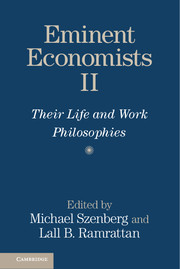Book contents
- Frontmatter
- Dedication
- Contents
- List of Contributors
- Foreword
- Preface and Acknowledgments
- Introduction
- 1 Being There: An Intellectual Journey
- 2 Social Norms in Economics and in the Economics Profession
- 3 Personal Reflections on My Professional Life
- 4 Gray Eminence?
- 5 Biochemist to Economist
- 6 Puzzles and Paradoxes: A Life in Applied Economics
- 7 Succeeding in Economics
- 8 My Research Strategy
- 9 My Philosophy of Economics, Life, and Everything (Not!)
- 10 Finding a Niche
- 11 Become an Economist – See the World
- 12 Practitioner of the Dismal Science? Who, Me? Couldn’t Be!!
- 13 One Job, Four Careers
- 14 My Life and Research Strategy
- 15 How I Ended Up Being a Multifaceted Economist and the Mentors I Have Had
- 16 Searching for My Personal Philosophy
- 17 Learning about the Evolving International Economy
- 18 Confessions of a Wellesley FEM
- 19 God, Ants, and Thomas Bayes
- 20 The Path of a Monetary Economist
- 21 Learning from the Field
- 22 Order in and through Disorder: The Invisible Hand as a Turbulent Regulator
- 23 The Education of an Economist
- 24 Faith, Science, and Religion
- 25 My Studies in International Economics
- 26 Sailing into the Wind
- 27 My Life and Work Philosophy
- 28 Scaling Fortress Economics
- 29 The Accidental Economist
- Index
- References
12 - Practitioner of the Dismal Science? Who, Me? Couldn’t Be!!
Published online by Cambridge University Press: 05 June 2014
- Frontmatter
- Dedication
- Contents
- List of Contributors
- Foreword
- Preface and Acknowledgments
- Introduction
- 1 Being There: An Intellectual Journey
- 2 Social Norms in Economics and in the Economics Profession
- 3 Personal Reflections on My Professional Life
- 4 Gray Eminence?
- 5 Biochemist to Economist
- 6 Puzzles and Paradoxes: A Life in Applied Economics
- 7 Succeeding in Economics
- 8 My Research Strategy
- 9 My Philosophy of Economics, Life, and Everything (Not!)
- 10 Finding a Niche
- 11 Become an Economist – See the World
- 12 Practitioner of the Dismal Science? Who, Me? Couldn’t Be!!
- 13 One Job, Four Careers
- 14 My Life and Research Strategy
- 15 How I Ended Up Being a Multifaceted Economist and the Mentors I Have Had
- 16 Searching for My Personal Philosophy
- 17 Learning about the Evolving International Economy
- 18 Confessions of a Wellesley FEM
- 19 God, Ants, and Thomas Bayes
- 20 The Path of a Monetary Economist
- 21 Learning from the Field
- 22 Order in and through Disorder: The Invisible Hand as a Turbulent Regulator
- 23 The Education of an Economist
- 24 Faith, Science, and Religion
- 25 My Studies in International Economics
- 26 Sailing into the Wind
- 27 My Life and Work Philosophy
- 28 Scaling Fortress Economics
- 29 The Accidental Economist
- Index
- References
Summary
Why did I become a labor economist concerned with the institutions that affect the lives of workers and the organization of work when I could have been an investment banker, McKinsey consultant, used-car salesman, or even a theorist working out the truths of the Invisible Hand on a blackboard in some dark office?
When I was in grade school, I did not dream of becoming an economist. I doubt that any kid does. I was more enthralled with literature – ah, to write the great American novel – or with managing a stable of villainous professional wrestlers à la the Grand Wizard, Lou Albano, or Classie Freddie Blassie. Those would be fun careers. Economics? Didn’t someone call that the dismal science? Who wants to be dismal?
There is an answer to the why economics? question that would please the Invisible Hand. This is that at age seventeen I calculated the expected present value of lifetime earnings from economics and other plausible careers and, taking account of my preferences for work activities, money, and risk, picked the career most likely to produce the highest utility. The Hand would be even happier if I told you that I had carefully weighed my abilities and interests – strong but not Putnam Prize–level math abilities, strong but not Chekhov-level writing abilities, strong but not Nelson Mandela–level social concerns – against the payof s to those abilities/interests in dif erent professions and determined that economics was the best fit.
- Type
- Chapter
- Information
- Eminent Economists IITheir Life and Work Philosophies, pp. 166 - 186Publisher: Cambridge University PressPrint publication year: 2014

